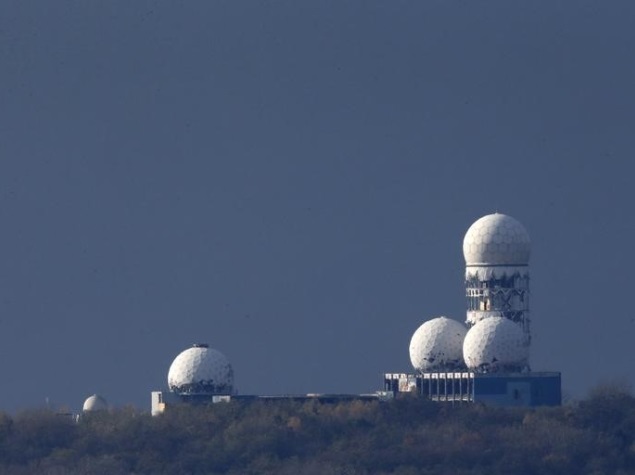- Home
- Internet
- Internet News
- US Senator to Propose Strong Curbs on NSA Bulk Phone Data Collection
US Senator to Propose Strong Curbs on NSA Bulk Phone Data Collection

Democratic U.S. Senator Patrick Leahy, chairman of the Senate Judiciary Committee, will introduce the legislation on Tuesday.
Because it does more to clamp down on the data collection exposed last year by former National Security Agency contractor Edward Snowden, Leahy's bill was expected to be more attractive to privacy advocates than a bill passed by the U.S. House of Representatives in May.
Many American technology companies have also been clamoring for changes after seeing their international business suffer as foreign governments worry they might collect data and hand it over to U.S. spy agencies.
The White House has been working closely with lawmakers, privacy experts and technology companies to secure Senate passage of what it considers critical legislation, National Security Council spokesman Ned Price said.
"Chairman Leahy has done remarkable work reflecting the equities of intelligence professionals while crafting privacy enhancements, and these efforts have yielded significant progress on issues vital to those stakeholders," Price said in an email on Monday.
President Barack Obama asked Congress in January to rein in the bulk collection and storage of records of millions of U.S. domestic telephone calls.
But the bill is not expected to come up for a vote in the Senate before Congress leaves for a five-week break on Aug. 1, which would prevent any action before next fall.
The House of Representatives passed the USA Freedom Act in May, but some privacy advocates and technology companies withdrew support because they wanted more extensive reforms.
Details of the Leahy bill have not been released.
But people who have seen recent drafts said it would go much further to reduce bulk collection of intelligence on Americans than the version that passed the House.
Both the House and Senate measures would keep information out of National Security Agency computers, but the Senate bill would limit how much of the data the spy agency could seek.
So-called telephone "metadata" documents the numbers involved, when the calls were made, and how long they lasted. Metadata does not include the content of the calls.
The NSA had legal authority to collect and hold for five years metadata for all telephone calls inside the United States. Although several courts declared the NSA program illegal, Snowden's revelations caused a political uproar.
Under Leahy's proposal, analysts would have more limitations on the terms they use to search for information, with large geographical areas and service providers' names ruled out as "selectors," a privacy expert said.
The measure also would also create the position of privacy advocate who would represent the public before the court that oversees the data collection program.
© Thomson Reuters 2014
Get your daily dose of tech news, reviews, and insights, in under 80 characters on Gadgets 360 Turbo. Connect with fellow tech lovers on our Forum. Follow us on X, Facebook, WhatsApp, Threads and Google News for instant updates. Catch all the action on our YouTube channel.
Related Stories
- Samsung Galaxy Unpacked 2025
- ChatGPT
- Redmi Note 14 Pro+
- iPhone 16
- Apple Vision Pro
- Oneplus 12
- OnePlus Nord CE 3 Lite 5G
- iPhone 13
- Xiaomi 14 Pro
- Oppo Find N3
- Tecno Spark Go (2023)
- Realme V30
- Best Phones Under 25000
- Samsung Galaxy S24 Series
- Cryptocurrency
- iQoo 12
- Samsung Galaxy S24 Ultra
- Giottus
- Samsung Galaxy Z Flip 5
- Apple 'Scary Fast'
- Housefull 5
- GoPro Hero 12 Black Review
- Invincible Season 2
- JioGlass
- HD Ready TV
- Laptop Under 50000
- Smartwatch Under 10000
- Latest Mobile Phones
- Compare Phones
- Realme Neo 8
- OPPO Reno 15 FS
- Red Magic 11 Air
- Honor Magic 8 RSR Porsche Design
- Honor Magic 8 Pro Air
- Infinix Note Edge
- Lava Blaze Duo 3
- Tecno Spark Go 3
- HP HyperX Omen 15
- Acer Chromebook 311 (2026)
- Lenovo Idea Tab Plus
- Realme Pad 3
- HMD Watch P1
- HMD Watch X1
- Haier H5E Series
- Acerpure Nitro Z Series 100-inch QLED TV
- Asus ROG Ally
- Nintendo Switch Lite
- Haier 1.6 Ton 5 Star Inverter Split AC (HSU19G-MZAID5BN-INV)
- Haier 1.6 Ton 5 Star Inverter Split AC (HSU19G-MZAIM5BN-INV)
















